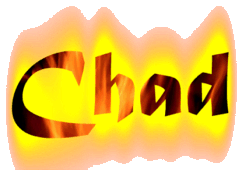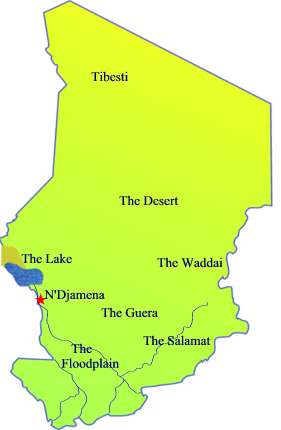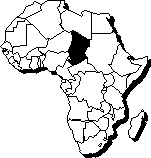
Distances on a map can be deceptive. Chad is a huge country - It is 1000 miles in length and
nearly 500 miles in width. It's land area is something on the order of twice
that of Texas.
Lake Chad is also worthy of mention, if only because it is disappearing. It is less than half its size of 50 years ago. It is a landlocked lake, but for reasons nobody quite understands, it does not become significantly saline. Also of note are seven 11,000 foot volcanoes up in the Tibesti desert near Libya. Demographically...With 11 million people, it has one of the smallest populations in Africa. Most of the population is concentrated in the south-western quadrant of the country. The capital N'Djamena, with something like a million people, has over 10% of the nation's populace. The infant mortality rate is 11%. Sociologically...The most significant social factor is the division between the predominantly Muslim northern peoples and the non-Muslim peoples to the south. The northerners (whom we somewhat erroneously call "Arabs") typically have a "chocolate" complexion, while the southerners are really "black". As a general rule, there is no love lost between them. For the last 30 years the northerners (who can shoot straighter - the key factor in Chadian politics) have held the reins of power in the capital. All the social factors which have produced such suffering and war in Sudan to the east also exist in Chad. It is only the grace of God and a benign live-and-let-live attitude on the part of the president that have averted a similar catastrophe in Chad. Such bitterness is the fruit of a long history of intra-African slave trade (which continued right up to the early years of the 20th century) and an equally long history of Islamic hegemony. Economically...The most significant economic factor in the country today is the discovery of oil in the south of Chad and north of Lake Chad. This discovery was made by a consortium led by Exxon. Other than that, there is no industry whatsoever in Chad (unless you count the cigarette and beer factories. Cotton is grown in the south of Chad for export. Commerce, such as it is, is controlled almost entirely by an Islamic "cartel" (for lack of a better word - although to be honest, they really are better businessmen than the non-Muslim folk). The vast majority of the population is either subsistence farmers or herders. Most of the population of the capital N'Djamena is unemployed. Agriculture and Herders...The staple crop in Chad is millet. (When you buy a bag of bird seed, the B-B's in it are millet). Each region of Chad has it's own particular species which is suited to the area. The millet is pounded into flour, mixed with water to the consistency of cookie dough or mashed potatoes, and served with some sort of gravy to give it some flavor. Chad has a myriad of different clans of nomads who herd cattle and sheep. Each clan has it's own particular "route" that they traverse each year - often covering hundreds of miles. The three principle groups are the Fulani, Mbororo, and Arabs - though there are hundreds of subdivisions within these groups. During the last 30 or 40 years it seems that some of these groups have become tired of wandering around and have settled down in villages. One such settlement is about 10 miles from Chageen. Linguistically...There are 127 languages spoken in Chad. Mark likes to compare Chad to the Chicago metro area - which has about 6 million people and maybe 120 suburbs and communities. If every suburb and every community in the city itself spoke a completely different language, you would have a fair representation of the linguistic diversity of Chad. Other web sites Stanford University Chad Page - Lots of links to just about every site imaginable Ethnologue - all the languages in Chad. the parent site of this link actually lists every language in the world with information on it. Go to Kwang that is the listing for Kwong (Mark's trying to get them to change the spelling).
|


